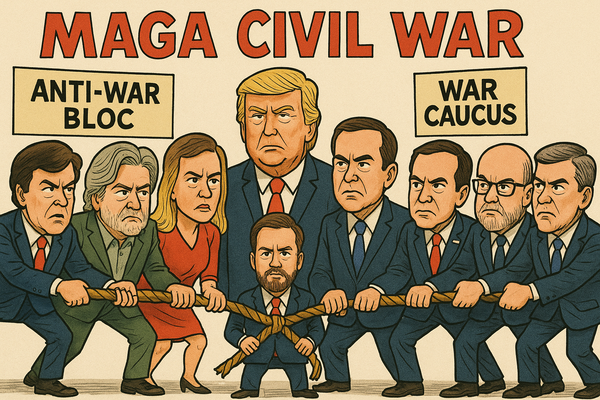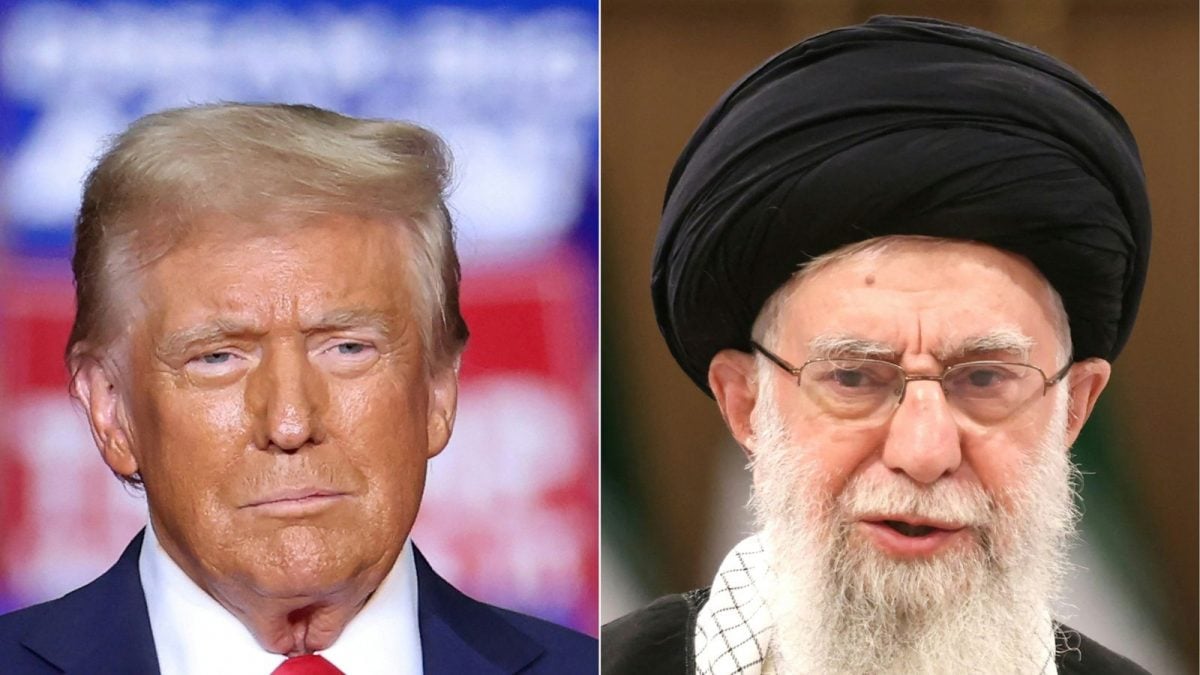ARTICLE AD BOX

As war clouds gather over Tehran, the “America First” coalition fractures—from Carlson’s outrage to Cruz’s crusade, with Vice President JD Vance echoing the commander-in-chief’s every word.
The MAGA Movement Promised No More Wars—Now It’s on the Brink of One
Donald Trump didn’t just win the 2024 election—he crushed it with a promise to rebuild America without stumbling into another foreign disaster. “No more stupid wars” became doctrine. His base connected with this pledge, proud that he hadn't launched any new wars.But now, deep into 2025, that legacy is under pressure. In June, Israel struck Iran’s nuclear facilities—and Trump responded by warning Iran’s leaders to surrender “unconditionally,” advising Tehran’s civilians to evacuate, and boasting that the U.S.
had “total control of the skies.”The MAGA movement—defined by its distrust of foreign entanglements—is experiencing an identity crisis. The coalition that brought Trump back to power is now split, torn between instincts that fueled his rise.

The Anti-War Wing: Carlson, Bannon, Greene, Gaetz—and the MAGA Grassroots
Tucker Carlson: MAGA’s Foreign Policy FirewallCarlson has emerged as the vocal anti-war leader within MAGA circles. He warned that war with Iran could end Trump’s presidency. During a dramatic on-camera exchange with Senator Ted Cruz, he challenged his hawkish views by questioning basic facts about Iran—its population, its sectarian landscape—and called out what he sees as dangerous ignorance dressed up as resolve.
To Carlson, this is Iraq 2.0. And allowing MAGA to shift toward intervention is nothing short of a betrayal.
Tucker and Ted Cruz Get Into Heated Debate on AIPAC and Foreign Influence
Steve Bannon: The Loyal DissenterBannon warned that a war with Iran could destroy the MAGA coalition. Yet he tempered the warning with neutrality, noting that even dissenting voices would ultimately fall in line behind Trump. His message: the base doesn’t want war, but Trump remains the centre of gravity.Marjorie Taylor Greene: Culture Warrior, Peace AdvocateGreene has remained firm in her opposition to escalation.
She’s made it clear that another conflict in the Middle East would betray the MAGA movement’s core promise: to put America first—at home, not in yet another desert war.Matt Gaetz: The Populist ScepticGaetz has voiced deep scepticism over renewed interventionism, warning that MAGA should not fall for recycled Bush-era framing. He’s dismissed hawkish rhetoric and cautioned that any move toward war must have a clearly defined exit strategy and real American interests at stake.
His message is clear: military might is not a substitute for strategic clarity.
The War Caucus: Cruz, Rubio, Levin, Hannity—Old Doctrine, New Labels
Ted Cruz: Confident, But Clueless?Cruz maintained a hawkish stance in public appearances, even as he fumbled through basic facts about Iran. He’s called Iran a threat and said the U.S. must act if necessary. His slip—confusing Israeli actions with American ones—highlighted the extent to which some MAGA hawks are ready for conflict, regardless of the details.Marco Rubio: From Miami to MossadNow serving as Secretary of State, Rubio has become the administration’s leading voice for a hardline Iran policy.
He insists that Iran must be denied not just weapons, but even enrichment capacity. His doctrine is simple: Iran cannot even come close to the nuclear threshold.Mark Levin and Sean Hannity: Reagan-era RevivalistsBoth Levin and Hannity have called for strong action. Levin has floated the idea of regime change. Hannity has embraced the logic of preemptive strikes. They represent the older, more muscular conservatism that sees war not as a failure—but as assertion of American strength.JD Vance: The Loyal Lieutenant, Not the PeacemakerVice President JD Vance, once the populist realist, now speaks with tight discipline. He hasn’t condemned the hawks. He hasn’t echoed the doves. He simply follows the President’s lead—repeating Trump’s lines, offering no deviation, and avoiding ideological entanglement. Vance is not acting as a bridge between factions. He’s acting as a megaphone for Trump. His silence is strategic. His discipline is total with the belief that if he holds on long enough, he's a shoo-in to the be Trump's successor.
Trump’s Game: Maximum Pressure, Minimum Commitment—So FarTrump has long weaponised ambiguity. He’s sent American forces into visible alert, named Iranian leaders, threatened air superiority—and yet, he hasn’t fired a shot. This is vintage Trump: threatening force without deploying it, posturing without committing.But the longer this game stretches, the more pressure mounts. Hawks want action. The base wants peace. And Trump, ever the tactician, wants both.
MAGA’s Iraq Flashback: The Ghost That Haunts Them Still
The language is all too familiar.
Talks of WMDs. Warning of rogue regimes. Accusations of appeasement. MAGA was born in rebellion against this rhetoric. Trump won hearts by denouncing the Iraq War as a historic failure. Now, those ghosts are back. And the question is whether the movement has truly changed—or merely changed labels.
The 2025 Test: Can MAGA Survive a Middle East War?
Trump’s current coalition—rooted in working-class values, suburban nationalism, and youth anti-establishment sentiment—says no to foreign adventures.
Most polls show his base is wary of intervention.But a gamble remains: if Trump escalates, that coalition could fracture. The internal pressure is mounting. MAGA’s future depends on whether it keeps its promise—or betrays the fierce anti-war impulse that helped redefine American politics in 2025.The Real War Is Inside MAGAThis is more than a foreign policy debate—it’s an ideological showdown.
- Anti-war bloc: Carlson, Bannon, Greene, Gaetz—warning against another Iraq, urging focus at home.
- War caucus: Cruz, Rubio, Levin, Hannity—championing confrontation and regime change.
- Intercepted by: JD Vance—standing in lockstep with Trump, no deviation.
- At the centre: Trump—wielding threats and uncertainties while testing the elasticity of a fractured coalition.
A strike on Iran may win a skirmish—but MAGA’s soul hangs in the balance. The real question now isn’t just “should we go to war?”—it’s “can MAGA survive it?”



.png)
.png)
.png)
















 4 hours ago
2
4 hours ago
2









 English (US) ·
English (US) ·